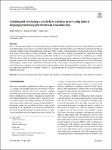Item Infomation
Full metadata record
| DC Field | Value | Language |
|---|---|---|
| dc.contributor.author | Allard, Oelen | - |
| dc.contributor.author | Markus, Stocker | - |
| dc.contributor.author | Sören, Auer | - |
| dc.date.accessioned | 2023-04-07T08:06:07Z | - |
| dc.date.available | 2023-04-07T08:06:07Z | - |
| dc.date.issued | 2023 | - |
| dc.identifier.uri | https://link.springer.com/article/10.1007/s00799-023-00360-7 | - |
| dc.identifier.uri | https://dlib.phenikaa-uni.edu.vn/handle/PNK/7674 | - |
| dc.description | CC BY | vi |
| dc.description.abstract | Due to the growing number of scholarly publications, finding relevant articles becomes increasingly difficult. Scholarly knowledge graphs can be used to organize the scholarly knowledge presented within those publications and represent them in machine-readable formats. Natural language processing (NLP) provides scalable methods to automatically extract knowledge from articles and populate scholarly knowledge graphs. However, NLP extraction is generally not sufficiently accurate and, thus, fails to generate high granularity quality data. In this work, we present TinyGenius, a methodology to validate NLP-extracted scholarly knowledge statements using microtasks performed with crowdsourcing. TinyGenius is employed to populate a paper-centric knowledge graph, using five distinct NLP methods. | vi |
| dc.language.iso | en | vi |
| dc.publisher | Springer | vi |
| dc.subject | TinyGenius | vi |
| dc.subject | Natural language processing | vi |
| dc.title | Creating and validating a scholarly knowledge graph using natural language processing and microtask crowdsourcing | vi |
| dc.type | Book | vi |
| Appears in Collections | ||
| OER - Công nghệ thông tin | ||
Files in This Item:

